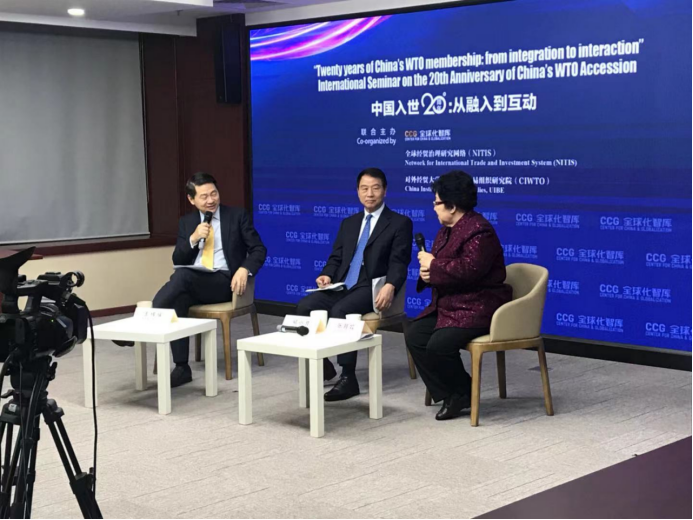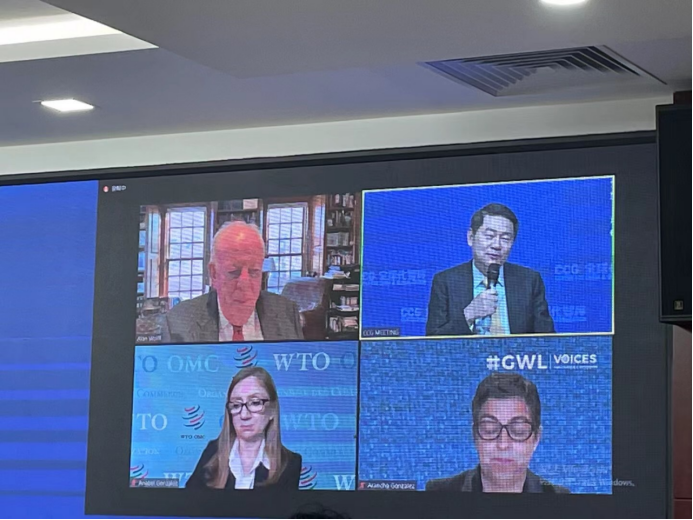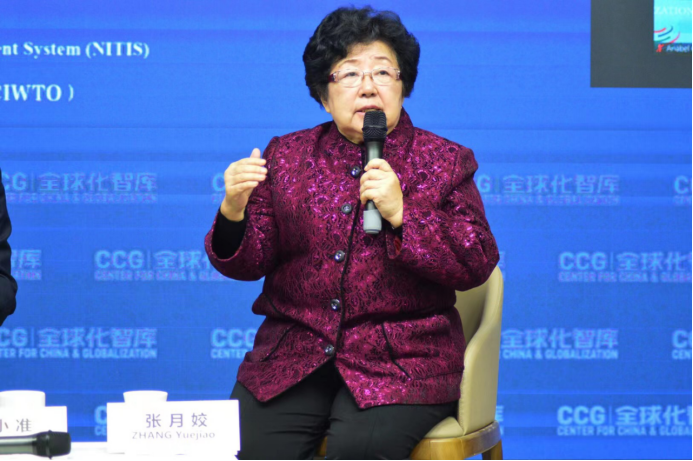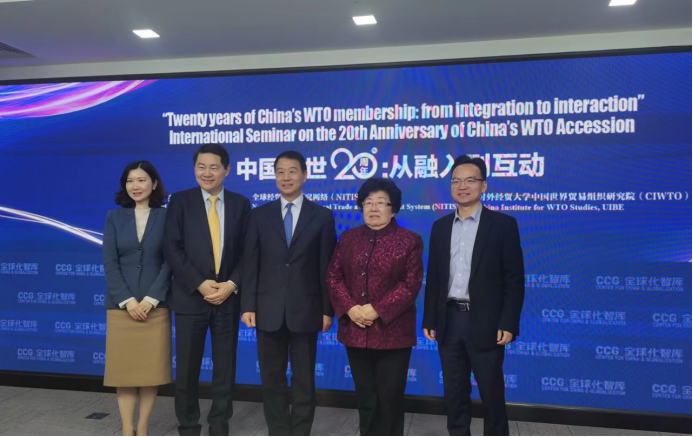全球经贸治理研究网络(NITIS)协办“中国加入世界贸组织20周年:从融入到互动”研讨会
2021-12-13
On the evening of 13th December, 2021, an international panel discussion on the 20th anniversary of China’s WTO Accession—“Twenty years of China’s WTO membership: from integration to interaction”— was successfully held offline and online. The seminar was co-organized by Center for China and Globalization (CCG), the Network on International Trade and Investment System (NITIS) and WTO Chair China at the University of International Business and Economics (UIBE). The panelists include Anabel Gonzalez, Deputy Director-General of WTO; Arancha Gonzalez Laya, former Foreign Minister of Spain; Alan Wolff, distinguished visiting fellow at Peterson Institute for International Economics (PIIE), former Deputy Director-General of WTO; Yi Xiaozhun, former Deputy Director-General of WTO; Zhang Yuejiao, Dean of Institute for International Dispute Settlementin Tsinghua University, Former Chairperson of WTO Appellate Body. The international panel discussion was hosted by Wang Huiyao, President of the CCG, Counselor to the State Council of China. And Professor Tu Xinquan, Secretary-General of NITIS, WTO Chair Holder for China-UIBE, Dean of the China Institute for WTO Studies also attended the meeting as a special commentator.

The five honored guests have given insightful speeches separately in the first part of the seminar. Former DDG Yi Xiaozhun was the first speaker to share his comment. Mr. Yi said that joining the WTO was the landmark for China’s reform and opening up, China has become the engine to boost the growth of the world economy since then. During these 20 years, China has accomplished great success and beautifully handled the unprecedented transformation. At present, China has turned into the center of global trade and climbed up the value chains. But at the same time, China also needs to stay alert to avoid falling into the middle-income trap. He believes that in the future, China will continue to actively participate in the global value chains, attract more foreign investment and reinforce the economic resilience, especially at this moment when multilateralism is facing great challenges and the WTO is in jeopardy. For China, there is still a very long way to go in order to maintain the multilateral trading system and prevent it from moving to protectionism. But he is optimistic about the future that China would deliver new reforms to the WTO, provide more public goods to the world and leave a multilateral trading system to our future generations.

DDG Anabel Gonzalez developed her speech from the following three aspects. First, looking back from the past, China had devoted 50 years’ hard work to eventually become a formal member of the WTO, and it was China’s accession that made the WTO a truly international trade organization. China’s participation promoted transparency in WTO rules and regulations, and the institutional effort made by China has also motivated the reform of the WTO. During the past 20 years, China has revised numerous domestic laws and created much better environment for foreign investment and trade. From 2001 to 2020, China’s imports and exports volumes have increased 9 folds, and the middle-class population has also expanded in China among this period. Both the consumers and producers from the entire world have benefited from China’s participation in the global trading system. All of these achievements prove that it is integration that helps a country catch up with the development of the world. From her perspective, Chinese people deserve to celebrate their success for the 20 years’ endeavor. Second, standing at the point of today, the WTO desperately needs collective wisdom and fresh ideas to stimulate reforms and changes. There are also some concerns about China from the other member states. She said that both China and the other WTO members could cooperate to make these changes happen. Third, looking forward to the future, the WTO is trying to seek a win-win situation by deepening cooperation between members. She hopes that China could take key responsibility and continue to be active in the negotiations of many subjects.

Former Minister Arancha Gonzalez Laya used an analogy of wedding to describe the relationship between China and the WTO. Like all kinds of marriage, the 20 years relationship is now both strong and delicate. China’s accession to the WTO has provided more legitimacy and made the WTO stronger than before. By smoothly managing the transformation, China and the Chinese government have become stronger too. It has also made the world stronger by offering consumers more choices, improve trade and finance environment etc. However, after 20 years the relationship inevitably became fragile as well. The impacts of China’s participation create challenges to Chinese citizens, Chinese workers and the workers from other countries. When we are talking about winners, there are also losers that should not be neglected. The WTO need to adapt to big change after embracing China into the party. Nowadays, what China does and not do will both generate huge impacts to the world. China not only needs to engage but also to co-lead in more fields.
Former DDG Wolff spoke highly of China’s accession to the WTO. According to him, China’s integration to the global trading system is the most significant movement in the world history. Since then, Chinese people’s life has been improved dramatically. In his opinion, China today has the resource and power to shape the world and bring reforms to the WTO. China has been performing actively in WTO joint initiatives and is playing more active role in many subjects. China could also contribute a lot to the battle against COVID-19 and some future pandemics. In the end, he mentioned that the 25th anniversary of China’s accession would also be a remarkable moment which needed to be celebrated. He was sure that CCG would also host a seminar and he would be very happy to attend. By that time, everyone could review the support that China would provide to WTO reform and evaluate China’s performance in the upcoming 5 years.
The last speaker of the panel was the former chairperson of WTO Appellate Body Zhang Yuejiao. She illustrated her points from the legal field, specifically the perspective of opening and the rule of law. The 20 years’ integration has created remarkable achievements for China. For example, China’s accession to the WTO improved the relationship between China and many other countries. The U.S. and the EU can reach agreements with China, and China’s participation also encourage more reforms and opening up. During the 20 years, China has greatly lowered the tariff from 50% (some sector even reached 80%) to 7.4% on average, which is even lower than what China has promised and committed 20 years ago. And the integration also benefits Chinese people since consumers can be able to buy cheaper goods. On the other hand, the rule of law has enhanced greatly after its accession. China has abolished approximately 2400 rules and 19000 local regulations. The business environment is much easier than before and China is continuing to implement more reforms. Looking at the current problems that the WTO is facing, she mentioned that the Appellate Body should be restored as soon as possible. The dispute settlement mechanism is a very important component to WTO’s functioning. She is confident that if the 164 members are working together with political will, even the more difficult issues could be solved successfully.

In the second part of the seminar, panelists together with the guests attending posted questions and discussed freely. Former DDG Yi echoed with the wedding analogy and asked how long this honeymoon could last. He and former chairperson Zhang both proposed that the WTO Ministerial Conference should not be held every 2 years or even longer, it should be organized more frequently such as once a year. All of the speakers agreed that in the future, China would cooperate more with other WTO members and provide more active support in multiple WTO reform initiatives. Professor Tu said that now a strong voice was uttering that the U.S. should stop damaging the dispute settlement system and doing more harm to the functioning of the WTO, while the opposite side insisted that China should reduce state intervention and stay close to the market rules. But the question of who should take the first step remains unsolved. Shall the two parties act together, and how? The media press also asked question about the role that China can play in the WTO. Mr. Yi responded that China can do a lot such as supporting proposals in line with the fundamental WTO principles, but China cannot do it alone.

In the end, each of the panelist shared their final thoughts to conclude the inspiring discussion. Former DDG Yi reinforced that resuming trust between members was the key to future WTO reforms. DDG Anabel Gonzalez is looking forward to more engagement and positive outcomes that China can bring. Former minister Arancha Gonzalez Laya believes the WTO will be more important in the future under the trend of reglobalization rather than deglobalization. Former DDG Wolff anticipated more progress from China. Former chairperson Zhang said that trade worked even better under the pandemic and she hoped to get reunion soon.

The international seminar is one of the series of outreach activities NITIS and WTO Chair China-UIBE hold this year. And with the support of the leading experts and scholars, we will organize more inspiring discussions and seminars to exchange ideas and wisdom.
浏览次数:


